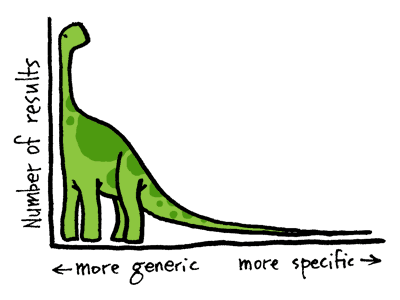Keyword research and search engine optimization thoughts for the long tail of keyword analysis

As an active member of social networks and online discussions, I recently came across a conversation on LinkedIn about the long tail of keyword analysis that got me thinking.
Avinash Kaushik explains the long tail of keyword analysis by stating that, “If your business is still thinking in terms of one keyword you will miss a lot of traffic, the name of the game is key phrases.” He explains that by targeting many longer keyword phrases, over time, you’re putting your website in the position to continually grow traffic.
We’d also add that while paying for keywords is instantaneous and will certainly drive a lot of traffic, that you need to also focus on your organic traffic in order to keep a steady flow of traffic.
Stefanie Rathjen Kelly, a Digital Marketing Professional, made this comment in the discussion on LinkedIn about the long tail of keyword analysis:
“If you sell cars and you are advertising on Google (or any search engine) the cost for a word “Cars” is going to be VERY pricey because there is so much competition for this word.
However, you may find in your long tail keyword analysis (i.e. looking at your weblogs to see what keywords users are typing in to get to your site) the phrase “2005 Used Red Honda Pilot” is driving some traffic to your site.
This would be considered a long tail keyword and much less expensive if you purchased this type of phrase for PPC advertising. The value of long tail keywords comes into play when you look at all of your long tail keywords in aggregate.
Individually they do not drive a lot of traffic, but many of these phrases together drive a good portion of the traffic and they may be driving higher qualified traffic to your site because users are looking for something very specific that you have.”
Read more from this conversation on LinkedIn.
[text_ad]
Picking keyword fights you can win
A large part of what we teach in our keyword research process is how to look up keyword competition.
The best SEO keyword strategy is to target keyword phrases that are more modest in popularity, and for which there is little competition.
To use an economic metaphor, you’re looking for modest demand and low supply.
The free Google Keyword Tool (GKT) can tell you the demand, and the Keyword Competitive Index (KCI) reveals the relationship of demand to competition.
The KCI is your estimated annual search impressions (monthly average searches taken from the GKT times 12 months) divided by the number of exact match search engine results (the competition) at a point in time.
Read more about using the Google Search Phrase Match command to find exact match search results.
The “sweet spot” for your SEO efforts is often a keyword phrase with a high KCI. At Mequoda Daily, we generally consider any keyword phrase with a KCI of “1” or better to be a high value, low-risk target.
Any keyword phrase with a KCI of .50 to .999 is a B-grade target. A keyword phrase with a KCI of .1 to .49 is a C-grade target. Anything with a lower KCI is not a reasonable target for Mequoda Daily and most of our consulting clients.
How do you choose your long-tail keywords? Let us know in the comments…



I think the best approach is just using that drop down menu in google search to find related keywords to yours that are longer tail.
Most of my traffic comes from long tail even though I have sites that rank okay for bigger keywords as well. They do add up.
Long tail traffic does definitely add up. I enjoy using the Google Keyword Tool to find as many relevant keyword phrases as possible. Even a search term that receives 100 searches a month can mean a bigger audience for our content.
Thanks for your comment.
Best,
Chris
Free SEO Analysis
Hi Moe:
We use a tool we built called the Google Visibility Report to track Keyword Universes up to 5,000 phrases. In addition to the GVR, which comes with your Mequoda Pro membership, you’ll need Advanced Web Ranking which collects position data for the GVR. Mequoda Pro membership also gives you access to the SEO training videos which explain the process and email help support.
Don
Excellent post, guys, as always.
I think the Keyword Competitiveness Index concept is a great one, but the challenge I’ve been having is analyzing KCI for large numbers of keywords.
Any suggestions for a useful tool (paid or free) that computes the KCI for a large volume of keywords at once?
I know, it’s the best I could do. You can always join the group 🙂
The link to the LinkedIn group discussion is useless unless you’re a member of the group.